Healthcare Management Course Syllabus, Grading Rubric, and Plan
VerifiedAdded on 2022/08/15
|9
|1791
|18
Homework Assignment
AI Summary
This document presents a comprehensive healthcare management course syllabus designed for nursing students. The course spans four semesters, covering topics such as healthcare management principles, leadership, quality management, funding, and workforce management. The syllabus outlines learning objectives, which include understanding healthcare management principles, leadership roles, ethical considerations, and professional growth. The teaching strategies emphasize both theoretical concepts and skill development, utilizing methods like question-based homework, concept mapping, and role-playing. Evaluation methods include subjective and practical assessments, with a detailed grading rubric provided. The course will be delivered primarily offline, with recorded lectures available for students. Required materials include textbooks, classroom resources, and technical equipment. The expected outcomes are that students will gain a strong understanding of healthcare management principles and be prepared to perform their duties effectively, with a focus on ethical practice and professional development. References to relevant literature are also included.
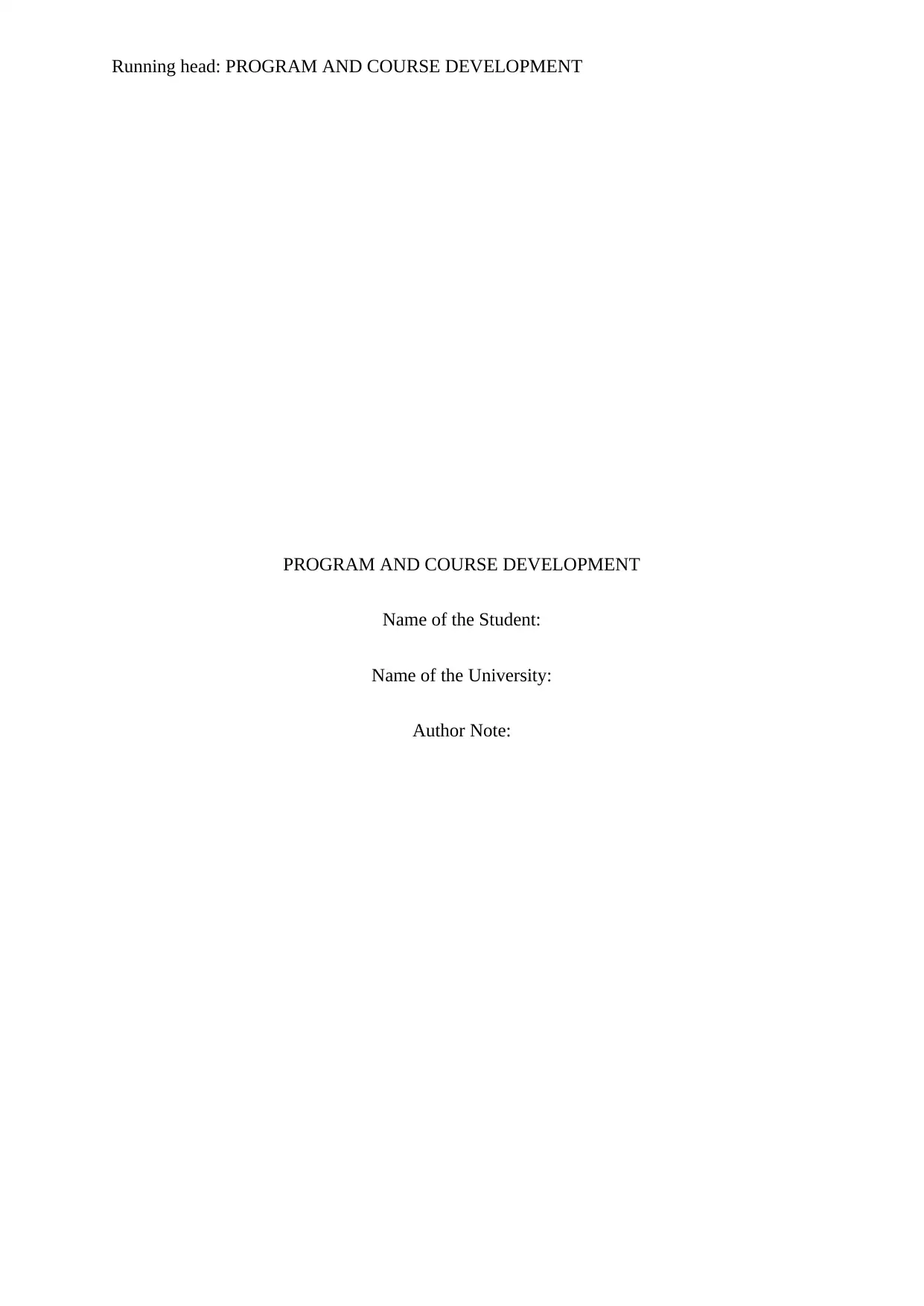
Running head: PROGRAM AND COURSE DEVELOPMENT
PROGRAM AND COURSE DEVELOPMENT
Name of the Student:
Name of the University:
Author Note:
PROGRAM AND COURSE DEVELOPMENT
Name of the Student:
Name of the University:
Author Note:
Paraphrase This Document
Need a fresh take? Get an instant paraphrase of this document with our AI Paraphraser
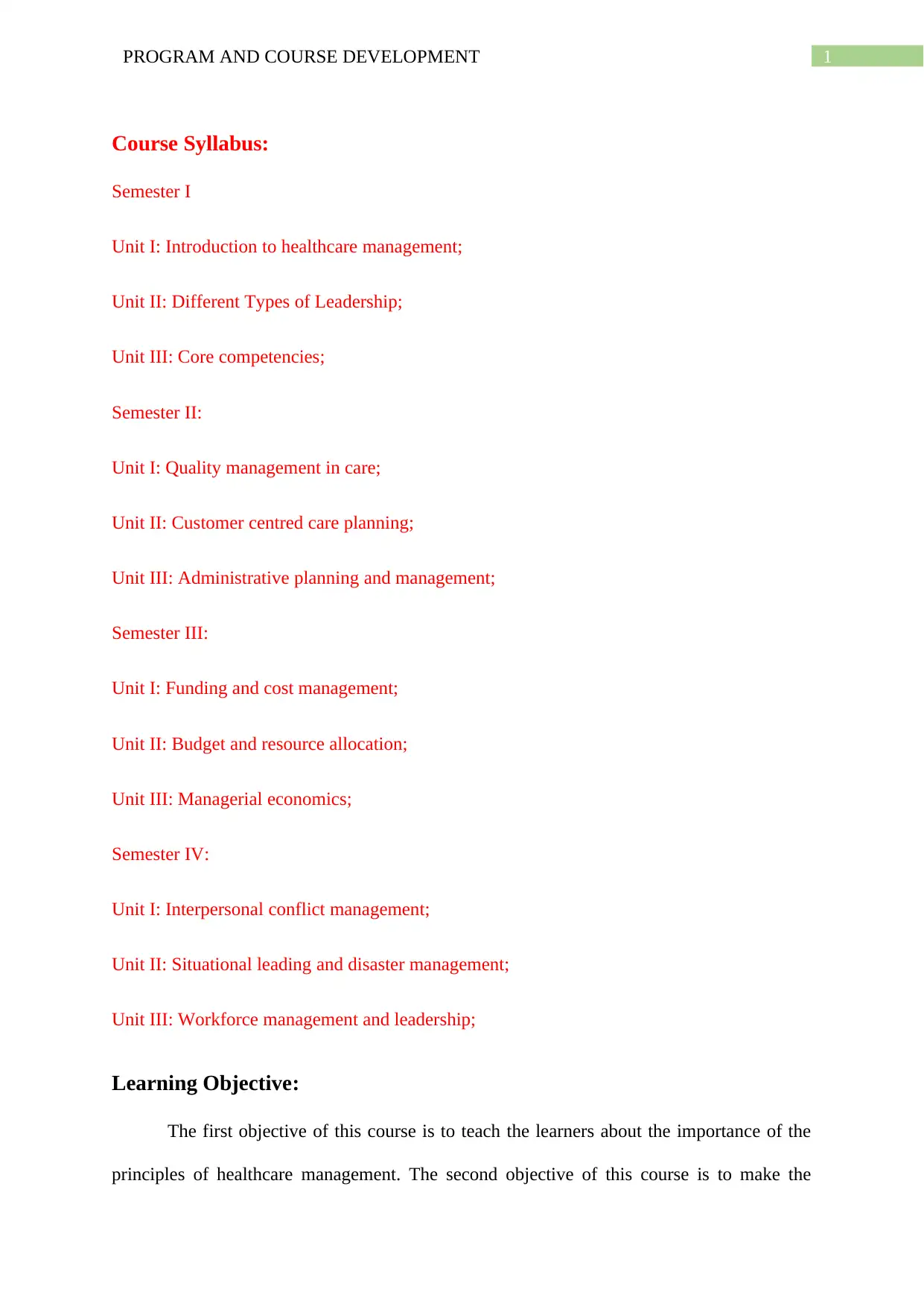
1PROGRAM AND COURSE DEVELOPMENT
Course Syllabus:
Semester I
Unit I: Introduction to healthcare management;
Unit II: Different Types of Leadership;
Unit III: Core competencies;
Semester II:
Unit I: Quality management in care;
Unit II: Customer centred care planning;
Unit III: Administrative planning and management;
Semester III:
Unit I: Funding and cost management;
Unit II: Budget and resource allocation;
Unit III: Managerial economics;
Semester IV:
Unit I: Interpersonal conflict management;
Unit II: Situational leading and disaster management;
Unit III: Workforce management and leadership;
Learning Objective:
The first objective of this course is to teach the learners about the importance of the
principles of healthcare management. The second objective of this course is to make the
Course Syllabus:
Semester I
Unit I: Introduction to healthcare management;
Unit II: Different Types of Leadership;
Unit III: Core competencies;
Semester II:
Unit I: Quality management in care;
Unit II: Customer centred care planning;
Unit III: Administrative planning and management;
Semester III:
Unit I: Funding and cost management;
Unit II: Budget and resource allocation;
Unit III: Managerial economics;
Semester IV:
Unit I: Interpersonal conflict management;
Unit II: Situational leading and disaster management;
Unit III: Workforce management and leadership;
Learning Objective:
The first objective of this course is to teach the learners about the importance of the
principles of healthcare management. The second objective of this course is to make the
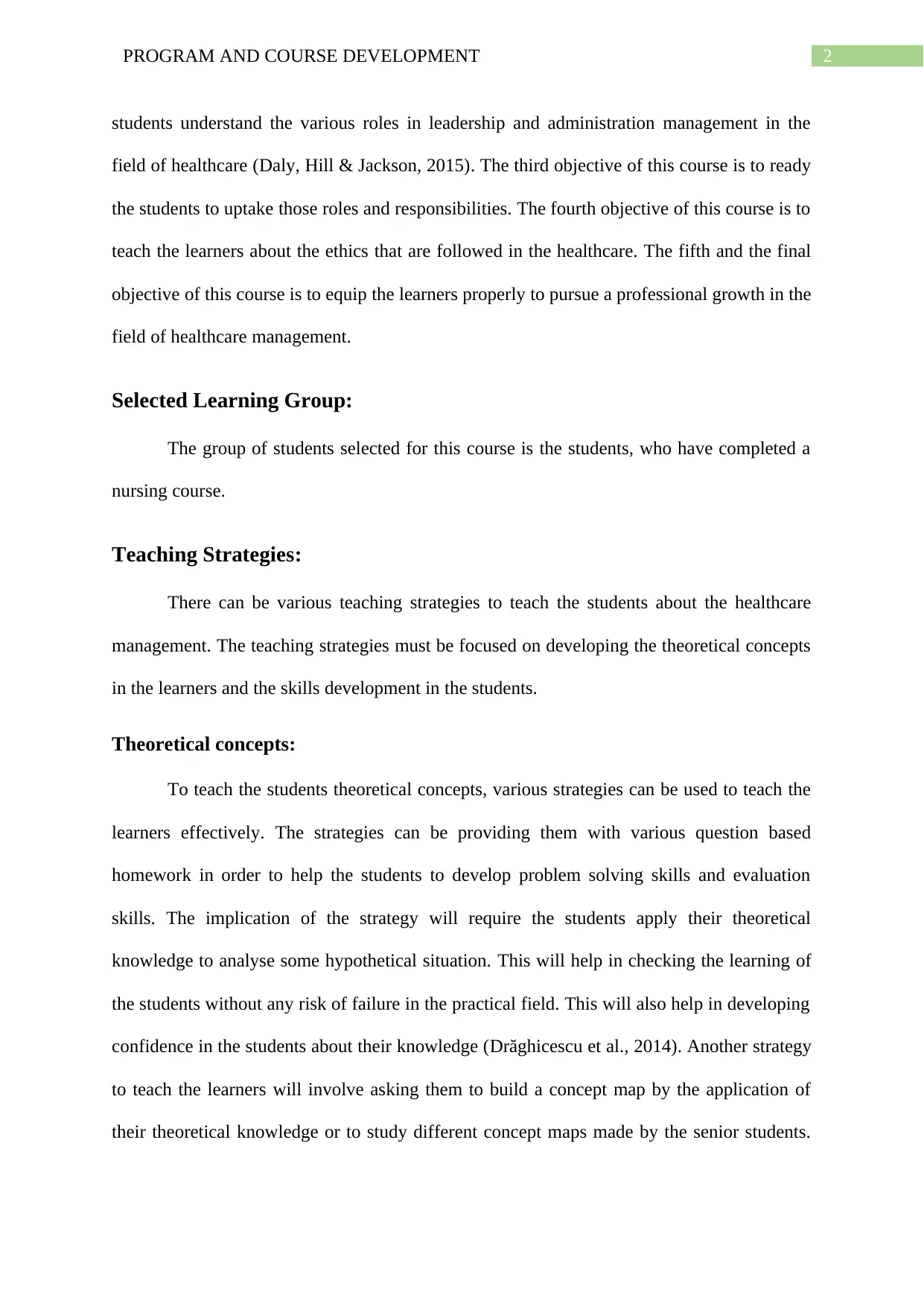
2PROGRAM AND COURSE DEVELOPMENT
students understand the various roles in leadership and administration management in the
field of healthcare (Daly, Hill & Jackson, 2015). The third objective of this course is to ready
the students to uptake those roles and responsibilities. The fourth objective of this course is to
teach the learners about the ethics that are followed in the healthcare. The fifth and the final
objective of this course is to equip the learners properly to pursue a professional growth in the
field of healthcare management.
Selected Learning Group:
The group of students selected for this course is the students, who have completed a
nursing course.
Teaching Strategies:
There can be various teaching strategies to teach the students about the healthcare
management. The teaching strategies must be focused on developing the theoretical concepts
in the learners and the skills development in the students.
Theoretical concepts:
To teach the students theoretical concepts, various strategies can be used to teach the
learners effectively. The strategies can be providing them with various question based
homework in order to help the students to develop problem solving skills and evaluation
skills. The implication of the strategy will require the students apply their theoretical
knowledge to analyse some hypothetical situation. This will help in checking the learning of
the students without any risk of failure in the practical field. This will also help in developing
confidence in the students about their knowledge (Drăghicescu et al., 2014). Another strategy
to teach the learners will involve asking them to build a concept map by the application of
their theoretical knowledge or to study different concept maps made by the senior students.
students understand the various roles in leadership and administration management in the
field of healthcare (Daly, Hill & Jackson, 2015). The third objective of this course is to ready
the students to uptake those roles and responsibilities. The fourth objective of this course is to
teach the learners about the ethics that are followed in the healthcare. The fifth and the final
objective of this course is to equip the learners properly to pursue a professional growth in the
field of healthcare management.
Selected Learning Group:
The group of students selected for this course is the students, who have completed a
nursing course.
Teaching Strategies:
There can be various teaching strategies to teach the students about the healthcare
management. The teaching strategies must be focused on developing the theoretical concepts
in the learners and the skills development in the students.
Theoretical concepts:
To teach the students theoretical concepts, various strategies can be used to teach the
learners effectively. The strategies can be providing them with various question based
homework in order to help the students to develop problem solving skills and evaluation
skills. The implication of the strategy will require the students apply their theoretical
knowledge to analyse some hypothetical situation. This will help in checking the learning of
the students without any risk of failure in the practical field. This will also help in developing
confidence in the students about their knowledge (Drăghicescu et al., 2014). Another strategy
to teach the learners will involve asking them to build a concept map by the application of
their theoretical knowledge or to study different concept maps made by the senior students.
⊘ This is a preview!⊘
Do you want full access?
Subscribe today to unlock all pages.

Trusted by 1+ million students worldwide
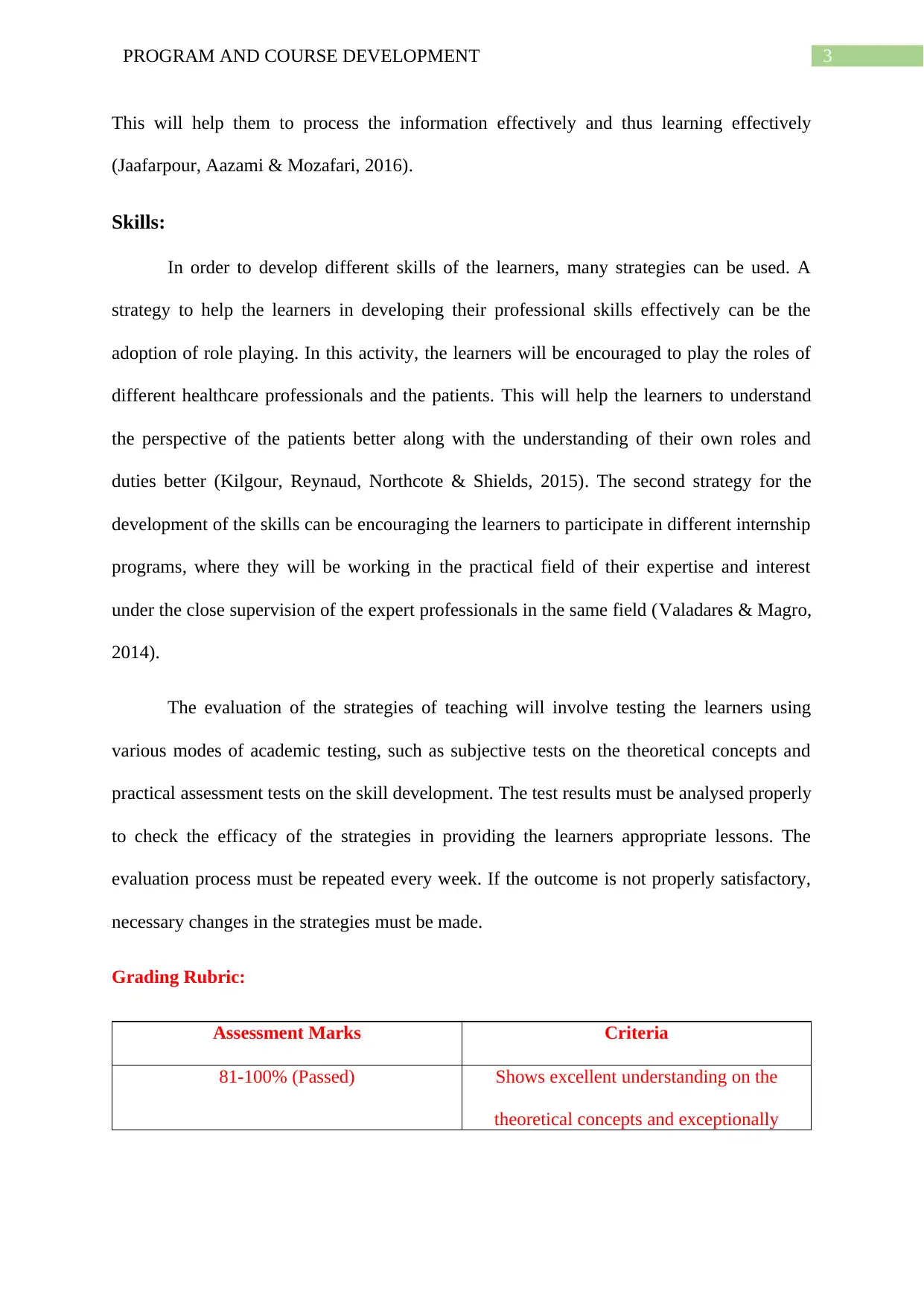
3PROGRAM AND COURSE DEVELOPMENT
This will help them to process the information effectively and thus learning effectively
(Jaafarpour, Aazami & Mozafari, 2016).
Skills:
In order to develop different skills of the learners, many strategies can be used. A
strategy to help the learners in developing their professional skills effectively can be the
adoption of role playing. In this activity, the learners will be encouraged to play the roles of
different healthcare professionals and the patients. This will help the learners to understand
the perspective of the patients better along with the understanding of their own roles and
duties better (Kilgour, Reynaud, Northcote & Shields, 2015). The second strategy for the
development of the skills can be encouraging the learners to participate in different internship
programs, where they will be working in the practical field of their expertise and interest
under the close supervision of the expert professionals in the same field (Valadares & Magro,
2014).
The evaluation of the strategies of teaching will involve testing the learners using
various modes of academic testing, such as subjective tests on the theoretical concepts and
practical assessment tests on the skill development. The test results must be analysed properly
to check the efficacy of the strategies in providing the learners appropriate lessons. The
evaluation process must be repeated every week. If the outcome is not properly satisfactory,
necessary changes in the strategies must be made.
Grading Rubric:
Assessment Marks Criteria
81-100% (Passed) Shows excellent understanding on the
theoretical concepts and exceptionally
This will help them to process the information effectively and thus learning effectively
(Jaafarpour, Aazami & Mozafari, 2016).
Skills:
In order to develop different skills of the learners, many strategies can be used. A
strategy to help the learners in developing their professional skills effectively can be the
adoption of role playing. In this activity, the learners will be encouraged to play the roles of
different healthcare professionals and the patients. This will help the learners to understand
the perspective of the patients better along with the understanding of their own roles and
duties better (Kilgour, Reynaud, Northcote & Shields, 2015). The second strategy for the
development of the skills can be encouraging the learners to participate in different internship
programs, where they will be working in the practical field of their expertise and interest
under the close supervision of the expert professionals in the same field (Valadares & Magro,
2014).
The evaluation of the strategies of teaching will involve testing the learners using
various modes of academic testing, such as subjective tests on the theoretical concepts and
practical assessment tests on the skill development. The test results must be analysed properly
to check the efficacy of the strategies in providing the learners appropriate lessons. The
evaluation process must be repeated every week. If the outcome is not properly satisfactory,
necessary changes in the strategies must be made.
Grading Rubric:
Assessment Marks Criteria
81-100% (Passed) Shows excellent understanding on the
theoretical concepts and exceptionally
Paraphrase This Document
Need a fresh take? Get an instant paraphrase of this document with our AI Paraphraser
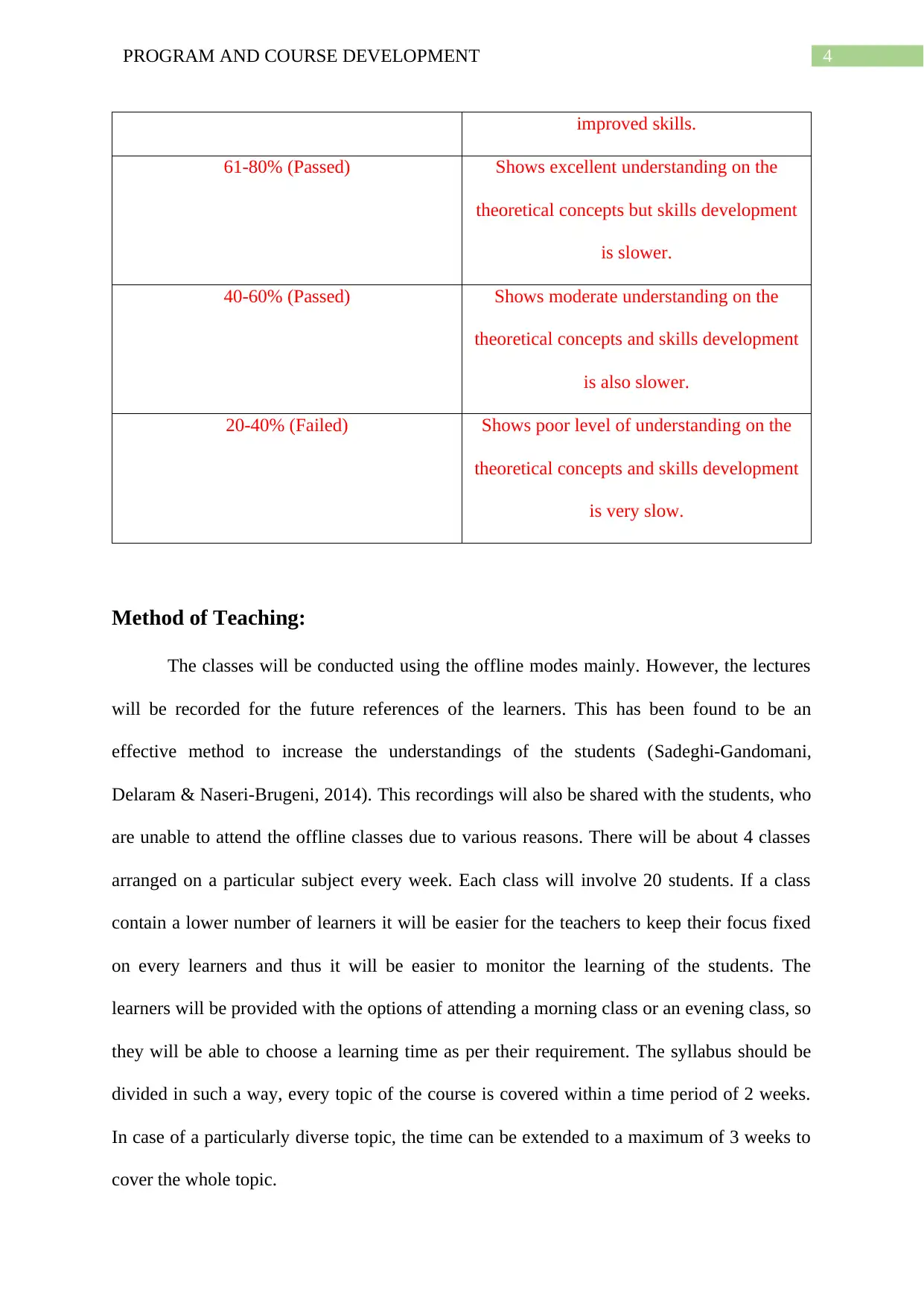
4PROGRAM AND COURSE DEVELOPMENT
improved skills.
61-80% (Passed) Shows excellent understanding on the
theoretical concepts but skills development
is slower.
40-60% (Passed) Shows moderate understanding on the
theoretical concepts and skills development
is also slower.
20-40% (Failed) Shows poor level of understanding on the
theoretical concepts and skills development
is very slow.
Method of Teaching:
The classes will be conducted using the offline modes mainly. However, the lectures
will be recorded for the future references of the learners. This has been found to be an
effective method to increase the understandings of the students (Sadeghi-Gandomani,
Delaram & Naseri-Brugeni, 2014). This recordings will also be shared with the students, who
are unable to attend the offline classes due to various reasons. There will be about 4 classes
arranged on a particular subject every week. Each class will involve 20 students. If a class
contain a lower number of learners it will be easier for the teachers to keep their focus fixed
on every learners and thus it will be easier to monitor the learning of the students. The
learners will be provided with the options of attending a morning class or an evening class, so
they will be able to choose a learning time as per their requirement. The syllabus should be
divided in such a way, every topic of the course is covered within a time period of 2 weeks.
In case of a particularly diverse topic, the time can be extended to a maximum of 3 weeks to
cover the whole topic.
improved skills.
61-80% (Passed) Shows excellent understanding on the
theoretical concepts but skills development
is slower.
40-60% (Passed) Shows moderate understanding on the
theoretical concepts and skills development
is also slower.
20-40% (Failed) Shows poor level of understanding on the
theoretical concepts and skills development
is very slow.
Method of Teaching:
The classes will be conducted using the offline modes mainly. However, the lectures
will be recorded for the future references of the learners. This has been found to be an
effective method to increase the understandings of the students (Sadeghi-Gandomani,
Delaram & Naseri-Brugeni, 2014). This recordings will also be shared with the students, who
are unable to attend the offline classes due to various reasons. There will be about 4 classes
arranged on a particular subject every week. Each class will involve 20 students. If a class
contain a lower number of learners it will be easier for the teachers to keep their focus fixed
on every learners and thus it will be easier to monitor the learning of the students. The
learners will be provided with the options of attending a morning class or an evening class, so
they will be able to choose a learning time as per their requirement. The syllabus should be
divided in such a way, every topic of the course is covered within a time period of 2 weeks.
In case of a particularly diverse topic, the time can be extended to a maximum of 3 weeks to
cover the whole topic.
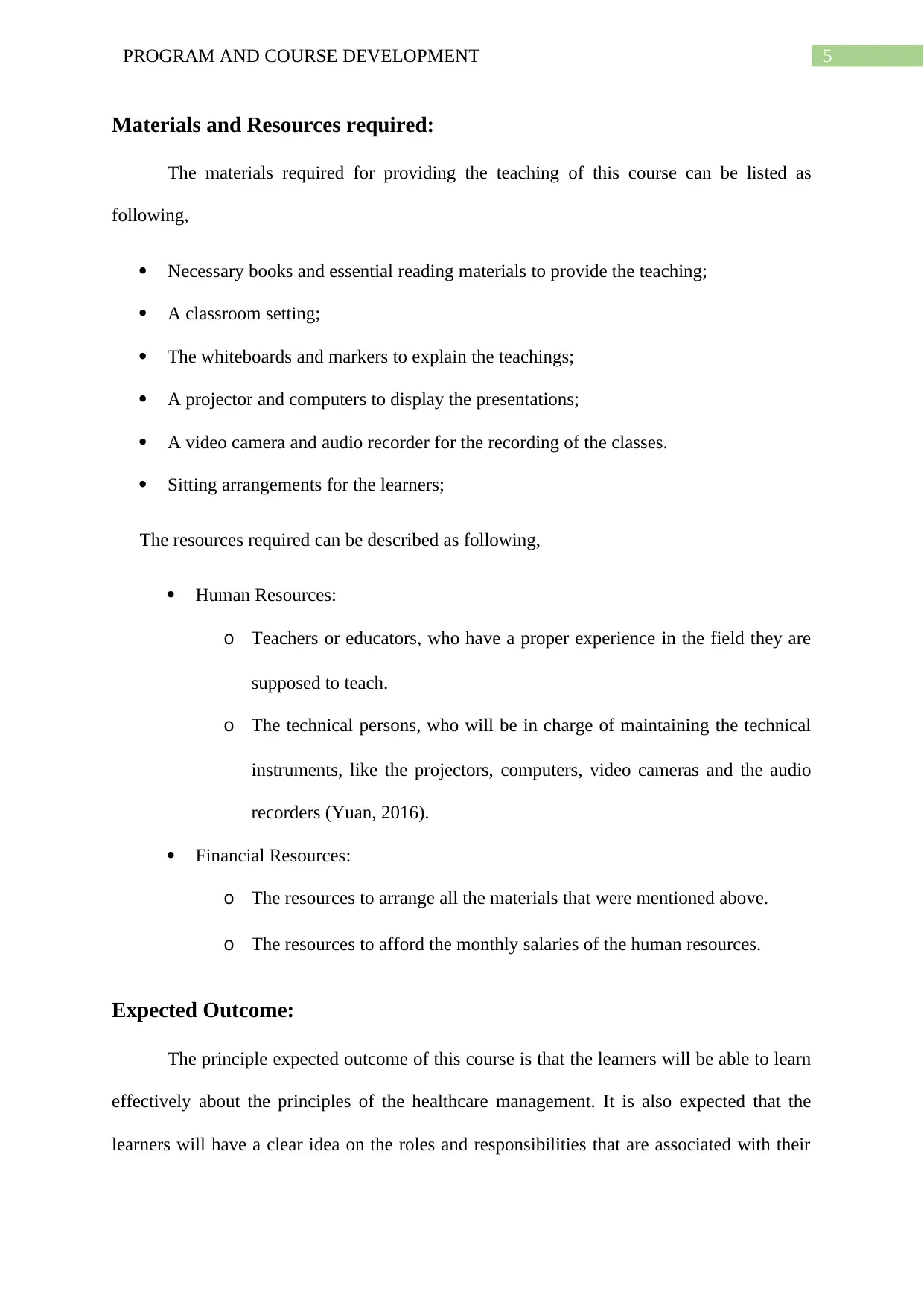
5PROGRAM AND COURSE DEVELOPMENT
Materials and Resources required:
The materials required for providing the teaching of this course can be listed as
following,
Necessary books and essential reading materials to provide the teaching;
A classroom setting;
The whiteboards and markers to explain the teachings;
A projector and computers to display the presentations;
A video camera and audio recorder for the recording of the classes.
Sitting arrangements for the learners;
The resources required can be described as following,
Human Resources:
o Teachers or educators, who have a proper experience in the field they are
supposed to teach.
o The technical persons, who will be in charge of maintaining the technical
instruments, like the projectors, computers, video cameras and the audio
recorders (Yuan, 2016).
Financial Resources:
o The resources to arrange all the materials that were mentioned above.
o The resources to afford the monthly salaries of the human resources.
Expected Outcome:
The principle expected outcome of this course is that the learners will be able to learn
effectively about the principles of the healthcare management. It is also expected that the
learners will have a clear idea on the roles and responsibilities that are associated with their
Materials and Resources required:
The materials required for providing the teaching of this course can be listed as
following,
Necessary books and essential reading materials to provide the teaching;
A classroom setting;
The whiteboards and markers to explain the teachings;
A projector and computers to display the presentations;
A video camera and audio recorder for the recording of the classes.
Sitting arrangements for the learners;
The resources required can be described as following,
Human Resources:
o Teachers or educators, who have a proper experience in the field they are
supposed to teach.
o The technical persons, who will be in charge of maintaining the technical
instruments, like the projectors, computers, video cameras and the audio
recorders (Yuan, 2016).
Financial Resources:
o The resources to arrange all the materials that were mentioned above.
o The resources to afford the monthly salaries of the human resources.
Expected Outcome:
The principle expected outcome of this course is that the learners will be able to learn
effectively about the principles of the healthcare management. It is also expected that the
learners will have a clear idea on the roles and responsibilities that are associated with their
⊘ This is a preview!⊘
Do you want full access?
Subscribe today to unlock all pages.

Trusted by 1+ million students worldwide
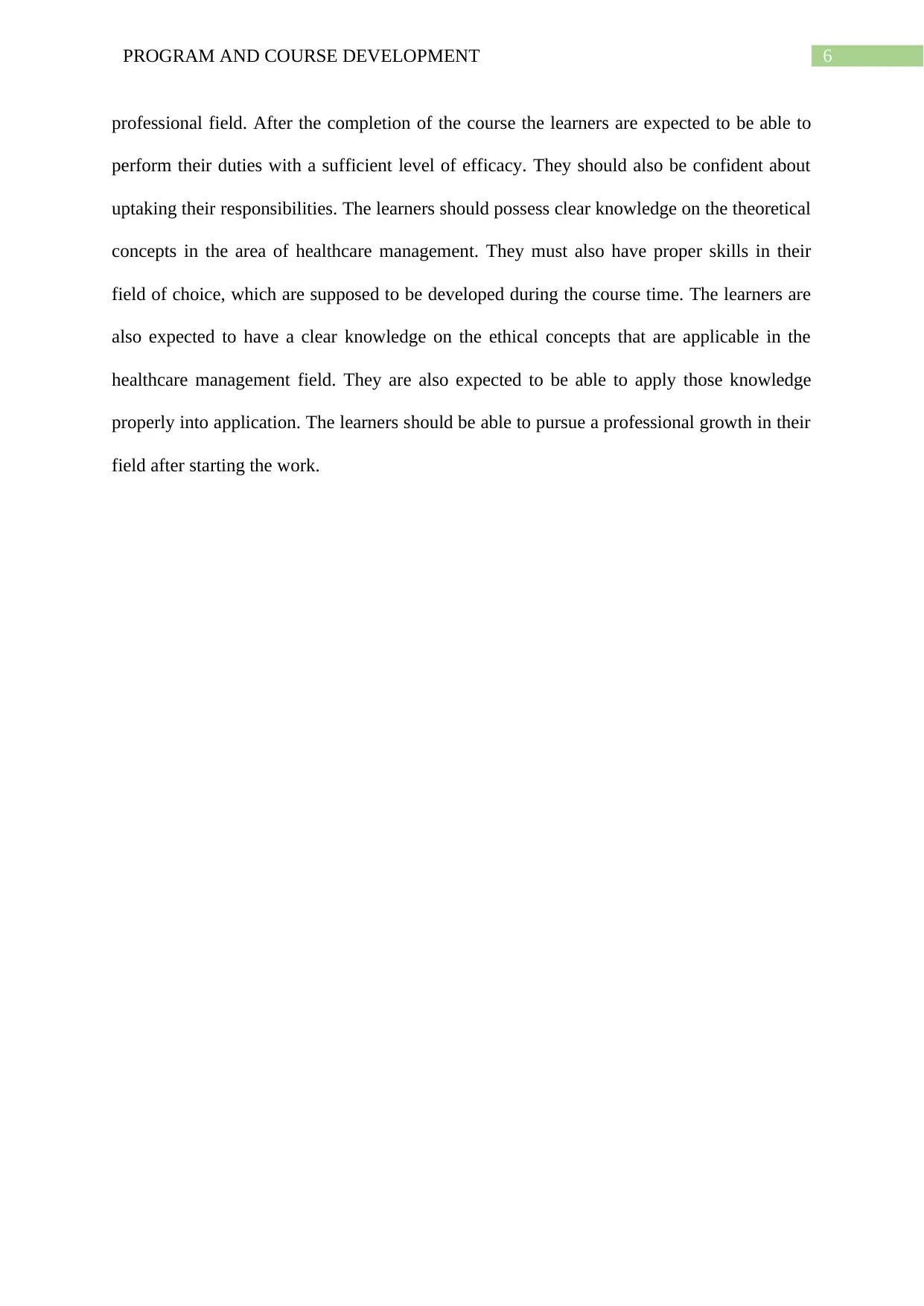
6PROGRAM AND COURSE DEVELOPMENT
professional field. After the completion of the course the learners are expected to be able to
perform their duties with a sufficient level of efficacy. They should also be confident about
uptaking their responsibilities. The learners should possess clear knowledge on the theoretical
concepts in the area of healthcare management. They must also have proper skills in their
field of choice, which are supposed to be developed during the course time. The learners are
also expected to have a clear knowledge on the ethical concepts that are applicable in the
healthcare management field. They are also expected to be able to apply those knowledge
properly into application. The learners should be able to pursue a professional growth in their
field after starting the work.
professional field. After the completion of the course the learners are expected to be able to
perform their duties with a sufficient level of efficacy. They should also be confident about
uptaking their responsibilities. The learners should possess clear knowledge on the theoretical
concepts in the area of healthcare management. They must also have proper skills in their
field of choice, which are supposed to be developed during the course time. The learners are
also expected to have a clear knowledge on the ethical concepts that are applicable in the
healthcare management field. They are also expected to be able to apply those knowledge
properly into application. The learners should be able to pursue a professional growth in their
field after starting the work.
Paraphrase This Document
Need a fresh take? Get an instant paraphrase of this document with our AI Paraphraser
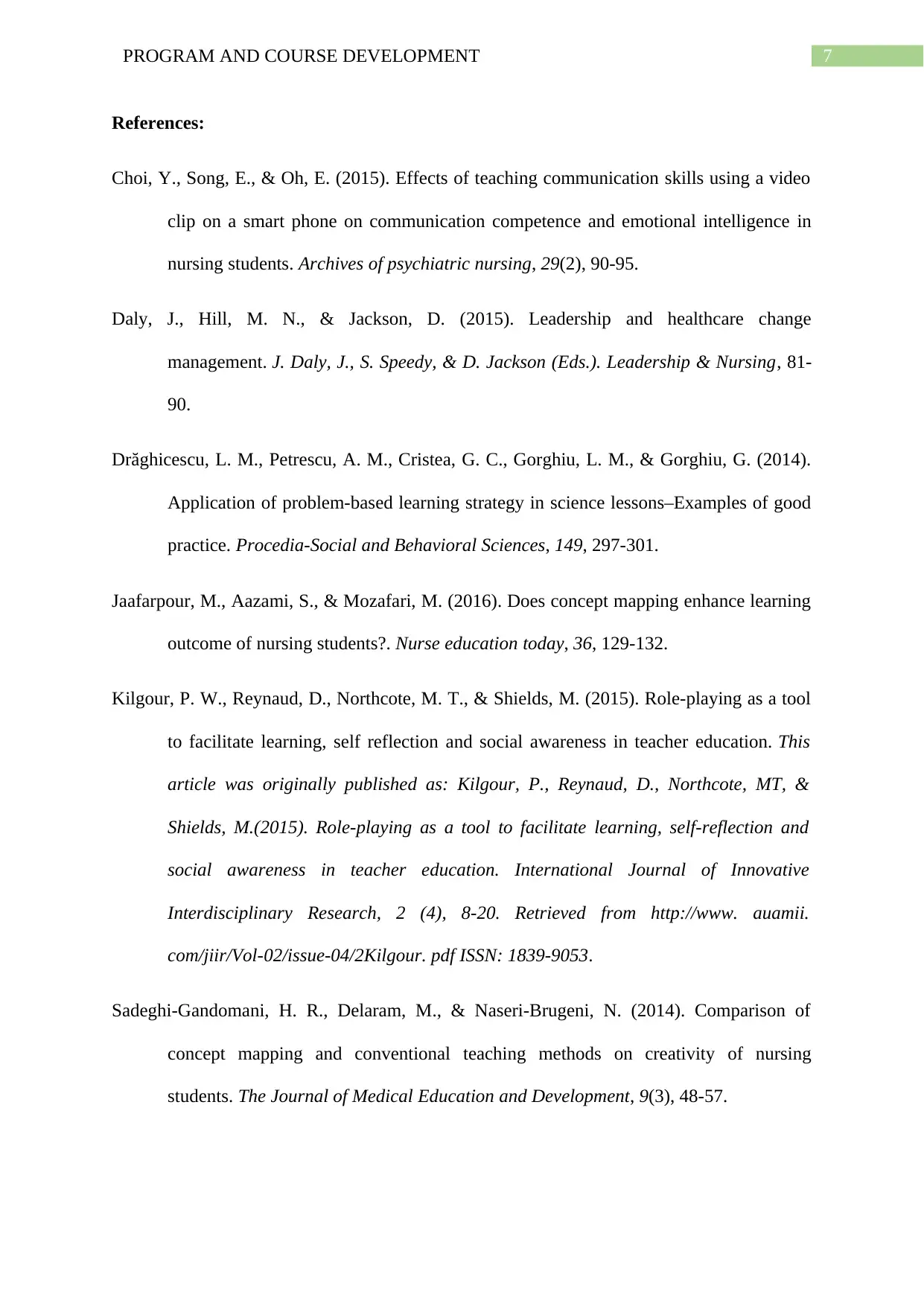
7PROGRAM AND COURSE DEVELOPMENT
References:
Choi, Y., Song, E., & Oh, E. (2015). Effects of teaching communication skills using a video
clip on a smart phone on communication competence and emotional intelligence in
nursing students. Archives of psychiatric nursing, 29(2), 90-95.
Daly, J., Hill, M. N., & Jackson, D. (2015). Leadership and healthcare change
management. J. Daly, J., S. Speedy, & D. Jackson (Eds.). Leadership & Nursing, 81-
90.
Drăghicescu, L. M., Petrescu, A. M., Cristea, G. C., Gorghiu, L. M., & Gorghiu, G. (2014).
Application of problem-based learning strategy in science lessons–Examples of good
practice. Procedia-Social and Behavioral Sciences, 149, 297-301.
Jaafarpour, M., Aazami, S., & Mozafari, M. (2016). Does concept mapping enhance learning
outcome of nursing students?. Nurse education today, 36, 129-132.
Kilgour, P. W., Reynaud, D., Northcote, M. T., & Shields, M. (2015). Role-playing as a tool
to facilitate learning, self reflection and social awareness in teacher education. This
article was originally published as: Kilgour, P., Reynaud, D., Northcote, MT, &
Shields, M.(2015). Role-playing as a tool to facilitate learning, self-reflection and
social awareness in teacher education. International Journal of Innovative
Interdisciplinary Research, 2 (4), 8-20. Retrieved from http://www. auamii.
com/jiir/Vol-02/issue-04/2Kilgour. pdf ISSN: 1839-9053.
Sadeghi-Gandomani, H. R., Delaram, M., & Naseri-Brugeni, N. (2014). Comparison of
concept mapping and conventional teaching methods on creativity of nursing
students. The Journal of Medical Education and Development, 9(3), 48-57.
References:
Choi, Y., Song, E., & Oh, E. (2015). Effects of teaching communication skills using a video
clip on a smart phone on communication competence and emotional intelligence in
nursing students. Archives of psychiatric nursing, 29(2), 90-95.
Daly, J., Hill, M. N., & Jackson, D. (2015). Leadership and healthcare change
management. J. Daly, J., S. Speedy, & D. Jackson (Eds.). Leadership & Nursing, 81-
90.
Drăghicescu, L. M., Petrescu, A. M., Cristea, G. C., Gorghiu, L. M., & Gorghiu, G. (2014).
Application of problem-based learning strategy in science lessons–Examples of good
practice. Procedia-Social and Behavioral Sciences, 149, 297-301.
Jaafarpour, M., Aazami, S., & Mozafari, M. (2016). Does concept mapping enhance learning
outcome of nursing students?. Nurse education today, 36, 129-132.
Kilgour, P. W., Reynaud, D., Northcote, M. T., & Shields, M. (2015). Role-playing as a tool
to facilitate learning, self reflection and social awareness in teacher education. This
article was originally published as: Kilgour, P., Reynaud, D., Northcote, MT, &
Shields, M.(2015). Role-playing as a tool to facilitate learning, self-reflection and
social awareness in teacher education. International Journal of Innovative
Interdisciplinary Research, 2 (4), 8-20. Retrieved from http://www. auamii.
com/jiir/Vol-02/issue-04/2Kilgour. pdf ISSN: 1839-9053.
Sadeghi-Gandomani, H. R., Delaram, M., & Naseri-Brugeni, N. (2014). Comparison of
concept mapping and conventional teaching methods on creativity of nursing
students. The Journal of Medical Education and Development, 9(3), 48-57.
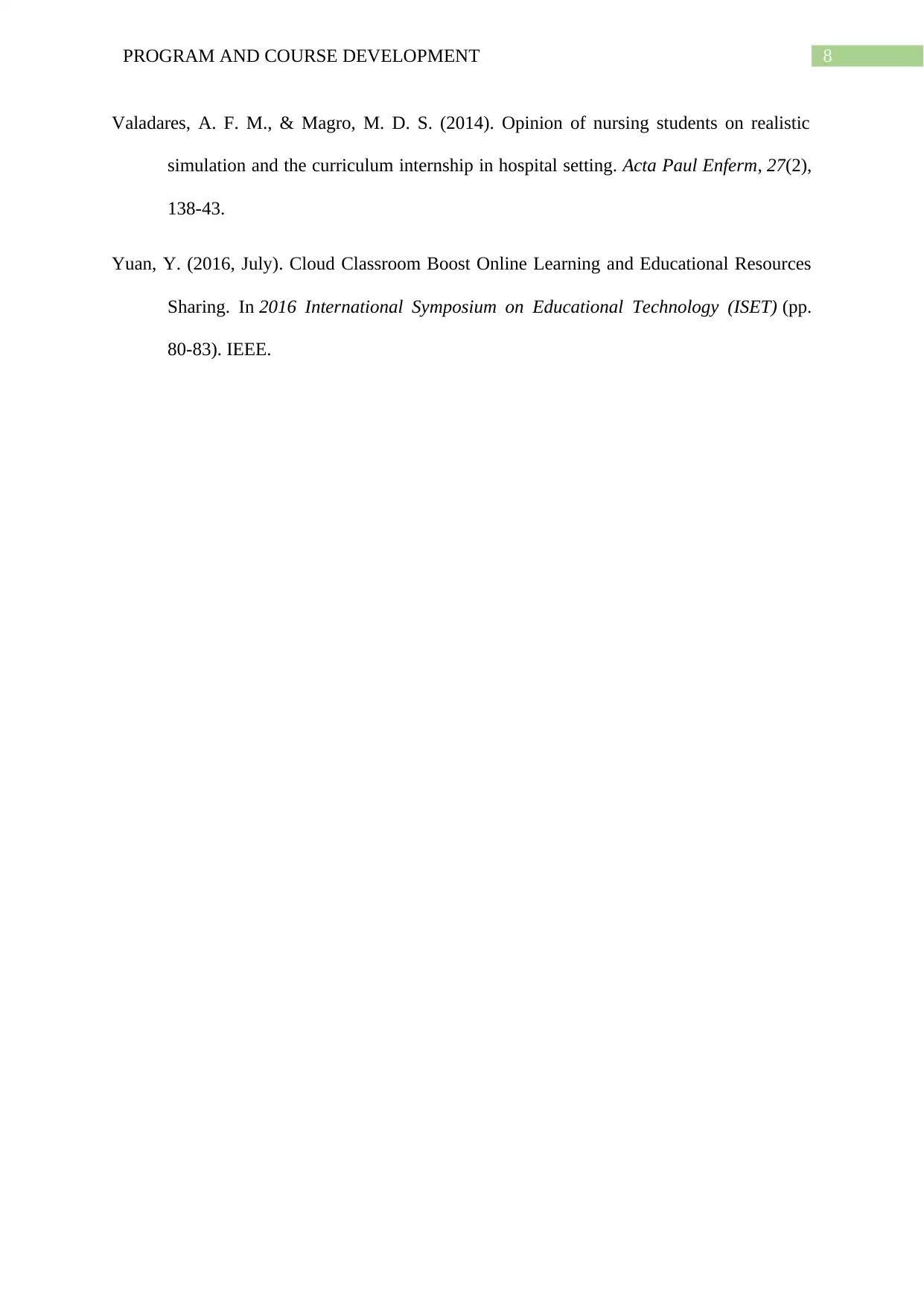
8PROGRAM AND COURSE DEVELOPMENT
Valadares, A. F. M., & Magro, M. D. S. (2014). Opinion of nursing students on realistic
simulation and the curriculum internship in hospital setting. Acta Paul Enferm, 27(2),
138-43.
Yuan, Y. (2016, July). Cloud Classroom Boost Online Learning and Educational Resources
Sharing. In 2016 International Symposium on Educational Technology (ISET) (pp.
80-83). IEEE.
Valadares, A. F. M., & Magro, M. D. S. (2014). Opinion of nursing students on realistic
simulation and the curriculum internship in hospital setting. Acta Paul Enferm, 27(2),
138-43.
Yuan, Y. (2016, July). Cloud Classroom Boost Online Learning and Educational Resources
Sharing. In 2016 International Symposium on Educational Technology (ISET) (pp.
80-83). IEEE.
⊘ This is a preview!⊘
Do you want full access?
Subscribe today to unlock all pages.

Trusted by 1+ million students worldwide
1 out of 9
Related Documents
Your All-in-One AI-Powered Toolkit for Academic Success.
+13062052269
info@desklib.com
Available 24*7 on WhatsApp / Email
![[object Object]](/_next/static/media/star-bottom.7253800d.svg)
Unlock your academic potential
Copyright © 2020–2025 A2Z Services. All Rights Reserved. Developed and managed by ZUCOL.





